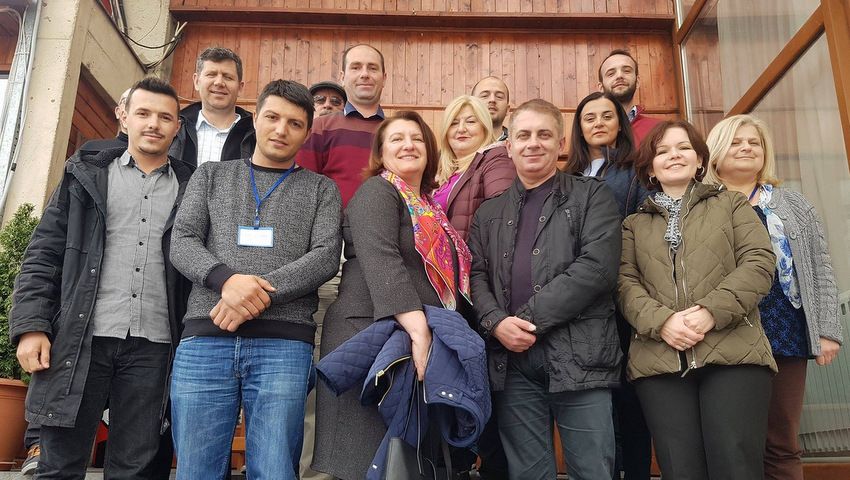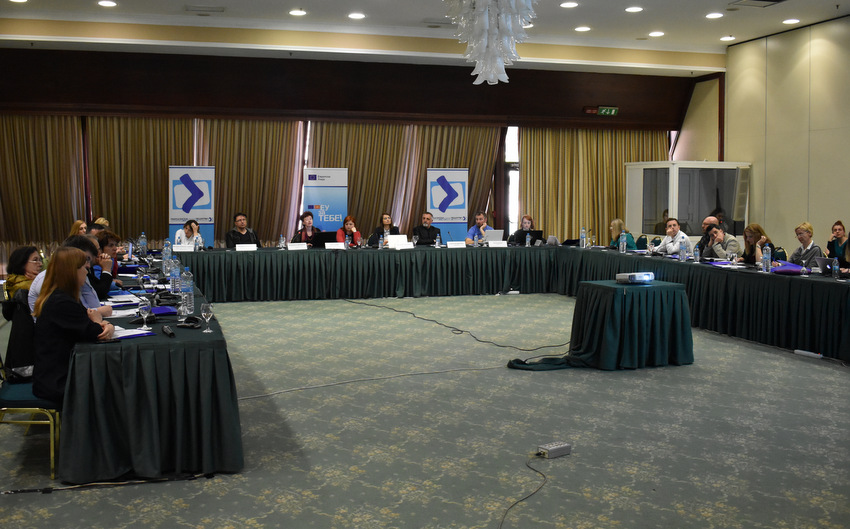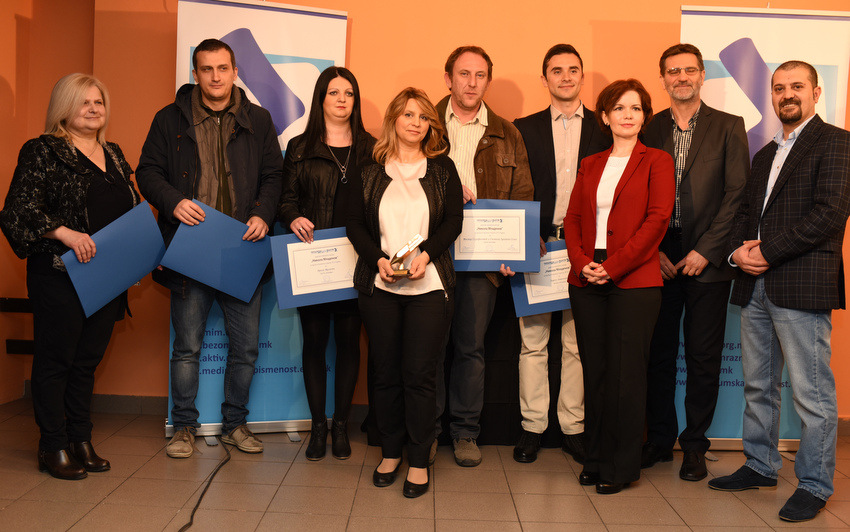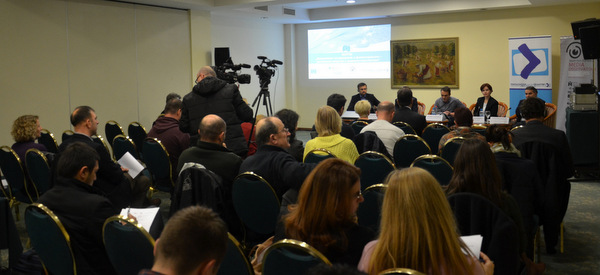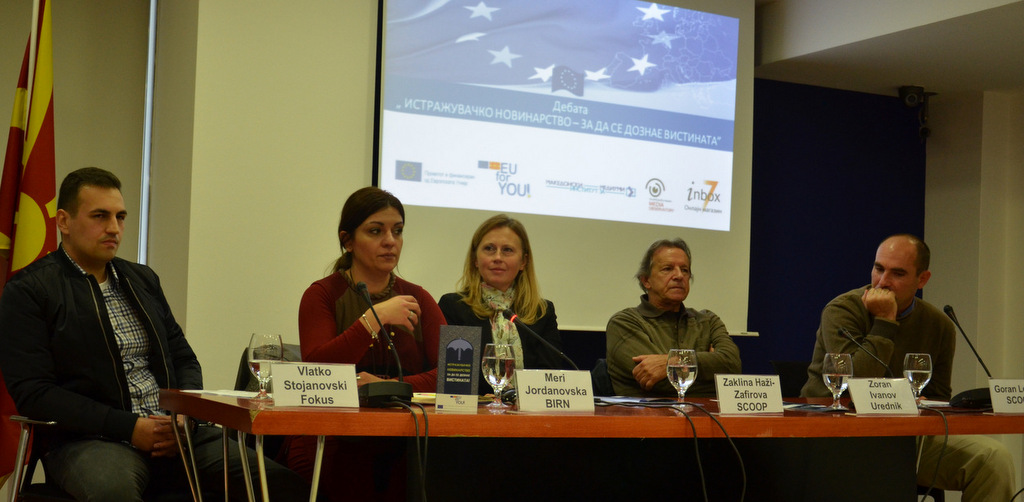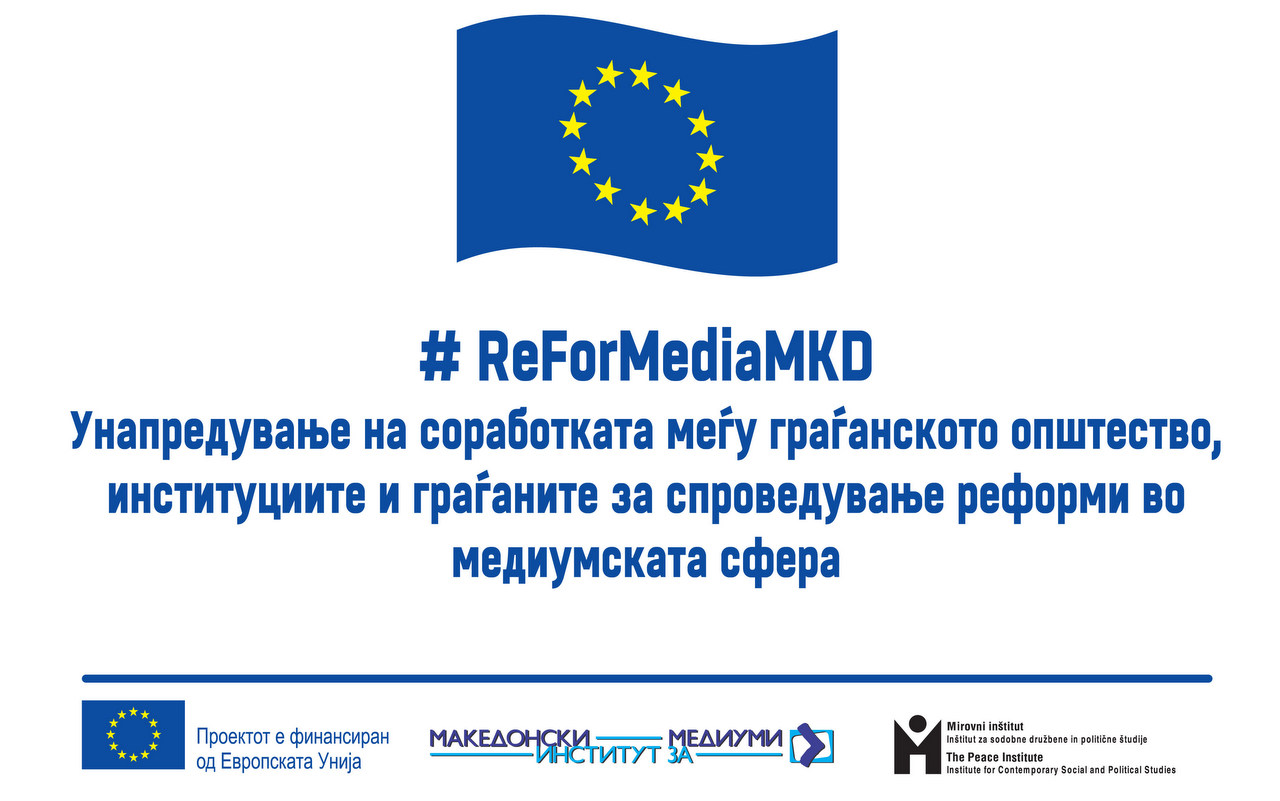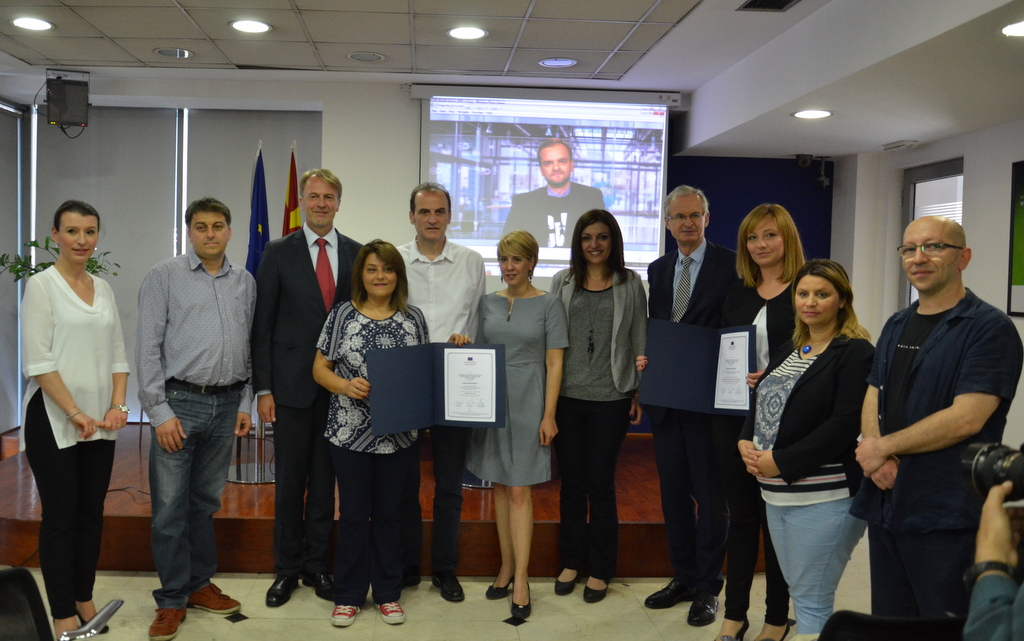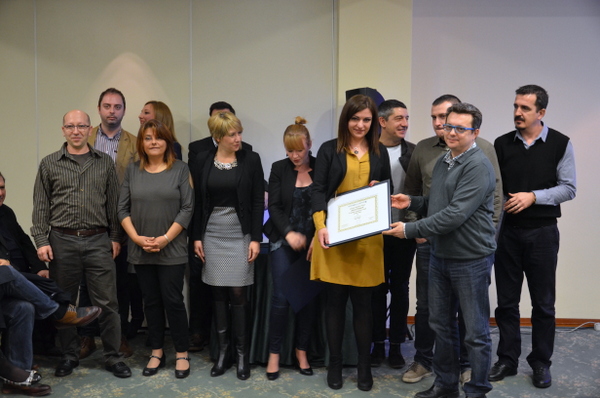The legal protection of journalists in accordance with international standards, the European Convention on Human Rights and national legislation was the subject of a two-day workshop organized by MIM on April 20 and 21 2017, in the frames of the project "Strengthening judicial expertise for freedom of expression and the media in Southeast Europe (JUFREX)" organized by the EU and the Council of Europe.
Journalists and editors from print and online media on national and local level, participated at the workshop, which hosted prominent legal experts and representatives of the media community as key speakers.
The international expert and former judge of the European Court of Human Rights, Ms. Mirjana Lazarova-Trajkovska, referred to Article 10 of the European Convention on Human Rights concerning freedom of expression and the practice of the Court in Strasbourg when it comes to cases related to violation of freedom of expression.
Mr. Lazar Sandev, prominent lawyer who has been working on media related cases, in his presentation focused on key aspects of the legal framework that guarantees the implementation of the right to freedom of expression, freedom of the media and the work of the journalists in Macedonia. He shared his own experience in representing journalists and media outlets in front of the domestic courts, especially in cases when it comes to lawsuits for insult and defamation.
The situation with media self-regulation in the country was presented by Mirce Adamcevski, the Chairman of the Complaints Commission of the Council of Media Ethics of Macedonia. Adamcevski highlighted challenges and support mechanisms for self-regulation by the stakeholders, in order to improve the professional reporting and protecting journalists from possible lawsuits.
The president of the Association of Journalists of Macedonia, Naser Selmani, shared their experiences regarding the protection of journalist’s rights. He stressed the recent judgement of the Strasbourg Court, which stated a violation of the right to freedom of expression and the right to a fair trial in the case of expelling the journalists from the Parliament’ gallery in December 24, 2012.
Participants agreed on the need to promote knowledge and awareness of journalists in relation to existing domestic laws that guarantee the right to freedom of expression, as well as to strengthen the skills of journalists in reporting on the work of the judiciary and the interpretation of court decisions and judicial terminology, including the work of the European Court of Human Rights. They also emphasized that in order to improve the legal protection of journalists during their daily work, a further improvement of legislation and its proper implementation is of immense importance.
News
The media and information literacy represent life skills that need to be mastered by all citizens as active participants in a democratic society. So far, the states and the other relevant actors in this area do not have a sufficient level of understanding about the concept of media literacy and its importance in the society, nor sufficient will to implement it. Therefore, the development of media and information literacy requires a comprehensive approach and involvement of all stakeholders at national, regional and European level. These are some of the conclusions of the regional conference "Media Literacy and Education Needs of Journalists and the Public", which was held on 28 and 29 March in Skopje in organization of the Macedonian Institute for Media.
The conference was organized within the regional project "South-East European Partnership for Media Development", implemented by the Center for Independent Journalism from Romania in cooperation with eight media organizations from Albania, Bosnia and Herzegovina, Serbia, Montenegro, Macedonia and Bulgaria, with support from the European Union. The conference was attended by approximately fifty experts from the media sector, academia, civil society and representatives of institutions and international organizations from the countries in Southeast Europe and Turkey.
The participants had the opportunity to discuss the findings and the recommendations of the comparative report on the media literacy and the educational needs of the journalists and the audience in Albania, Bosnia and Herzegovina, Macedonia, Serbia and Montenegro. Discussions were also held about the models of journalism education and about the situation in terms of the media literacy of the audience, as well as their importance for the freedom of expression and media freedom.
The discussants concluded that the states should provide the necessary support for the inclusion of the programs on media and information literacy in the educational process from an early age and to contribute to the greater promotion of the media education of the citizens. The civil society organizations should be an active partner in the process by developing innovative projects and awareness raising campaigns for the citizens about the importance of the media literacy, aimed at the promotion of the democratic values.
The conclusion was that in almost all countries in the region it is necessary to improve and modernize the programs for journalism education through greater cooperation with the media industry and the professional associations, so that the students would be enabled to learn through practice and acquire basic experience in the journalistic profession.
The photo-gallery of the event is available here.
Miomir Serafinovic and Snezana Lupevska-Sozen won the first place on the MIM’ contest for the journalism award “Nikola Mladenov” for the best investigative story for 2016. The wining story, aired in the TV programme “KOD” on Telma TV, investigates the circumstances of the mysterious death of Kosta Krpac, one of the witnesses of the Special Prosecution and also one of many who were granted amnesty and abolition by the President. The story revealed details and moments related with the tragic event, which later were confirmed in the investigation that lasts by this moment, although the Public Prosecution assessed that it was a suicide.
The second award was bestowed to Zoran Jovanoski for the video story “The ashes of death” aired in the TV show “360 degrees” on Alsat-M TV. The story reveals the terrifying health consequences of the people and of the environment caused by the work of the power plant “Oslomej”, in time when the country announces that it is going to continue the work of the plant.
Irena Mulacka, journalist in the weekly “Fokus” was awarded with the third prize on the contest, for the serial of texts which reveal frightening data for the death of 80 newborns at the Skopje Clinic for Gynecology in just six months.
This year, the jury decided to give a recognition for distinguished journalistic engagement to the journalists Vlado Apostolov for the stories “Dots on the tender for cleaning the Government”, “How did the yellow building grew-up in neoclassic castle”, “Voters live in Sveti Nikole, but have addresses in Skopje” and the serial “ The estate of Vladimir Zdravev”, all published on the web-portal “Prizma”, as well to Stojanka Mitreska for the story “The mushroom factory got moldy earlier”, also published on “Prizma”.
The MIM’ awards for the best investigative story of the year has been awarding since 2001, as part of the efforts for promotion of professional journalism and democratic values in the country.
The media literacy of the audience and the educational needs of the journalists were the focus of the expert discussion and the two-day workshop organized by the Macedonian Institute for Media, in cooperation with the Center for Independent Journalism from Romania, as part of the regional project "SEE Partnership for Media Development" funded by the European Commission. The perspectives and the challenges in terms of the introduction of the concept of media literacy in the Macedonian society, as well as the role of the journalism education in terms of the affirmation of the professionalism in the journalistic profession, were the subject of the expert debate which was attended by representatives of the journalism faculties, the secondary schools, the regulatory body, the media and the civil society organizations which are working in the field of media literacy.
During the event, the findings and the recommendations of the „Survey on the educational needs of the journalists and the media literacy of the audience in Macedonia“, were presented, which survey was made by the research team of MIM. In terms of the media literacy of the audience, the participants agreed that, despite the engagement of the civil society organizations, there is a need for more active involvement of the relevant state institutions, from the aspect of introducing media literacy in the education at the earliest age, as well as in terms of educating the older audience through campaigns of public interest.
The negligence of the professional standards in journalism and the long-lasting crisis in the media sphere have a negative impact on the young journalists and students who are yet to be professionally upgraded. In this regard, the debaters stressed that greater involvement of the journalism faculties is necessary in order to better prepare the future journalists for work in the editorial desks. According to some participants, the faculties should ensure an effective balance between the theoretical and the practical skills, strengthen the cooperation with the media in order to provide practical training for the students, revise the curricula by including local examples from everyday life and educate journalists who will work ethically, professionally and in the interest of the public.
Before the expert debate, a two-day workshop was also organized about the role of the media literacy in the more active involvement of the citizens in the democratic processes, which was conducted by Cristina Lupu and Ioana Avadani form the Center for Independent Journalism from Romania, as well as Zoran Bojarovski, a long-time journalist and editor in the Macedonian media. The participants were introduced to the concept of media literacy and its practicing worldwide, compared to the local perspectives, and they also discussed about the role of the different institutional and non-institutional stakeholders in the promotion of the media literacy. They developed ideas for advocacy campaigns about the concept of media literacy and its importance for a democratic society.
The report of the "Survey on the educational needs of the journalists and the media literacy of the audience in Macedonia" is available below:
Media business and journalism, and the role of state institutions in protecting media integrity were the main topics of the forum "Media integrity and funding - regional experiences and domestic perspectives", organized by the Macedonian Institute for Media within the project "Southeast European Media Observatory".
Citizens usually do not have a clear idea that enormous sums of public money are in stake in the cases of misuse of budgetary funds by institutions. Therefore, investigative journalists have to find alternative, sometimes visual ways to bring information closer to the citizens. They should put more efforts and energy, as well as devote more attention in order to persuade people to take part with their personal testimonies in the investigative stories.
MIM in partnership with the Peace Institute from Ljubljana, Slovenia, in the next three years (2016-2018), will implement the project “#ReForMedia – Enhancing the cooperation between the civil society, institutions and citizens for implementing reforms in the media sphere”. The project wants to contribute in increasing the influence of civil society in development and implementation of media reforms in the country. Financial support for the project is provided by the European Union.
The journalist Boris Georgievski won the first prize at this year's "EU Award for Investigative Journalism" contest, for the series of articles titled "Dossier Telecom", published on the web-portal "Prizma". The story reveals the developments related to the "Telecom" corruption affair and the numerous controversies that are associated with the company's operations and the relations with the Macedonian political leadership since 2001.
Team of investigative journalists from BIRN Macedonia won the first place on MIM’s contest for the journalism award “Nikola Mladenov” for best investigative story of 2015. The winning story “Skopje 2014 Uncovered” is awarded for the series of stories and interactive online database that disclose spending the public money for the controversial project “Skopje 2014”.

